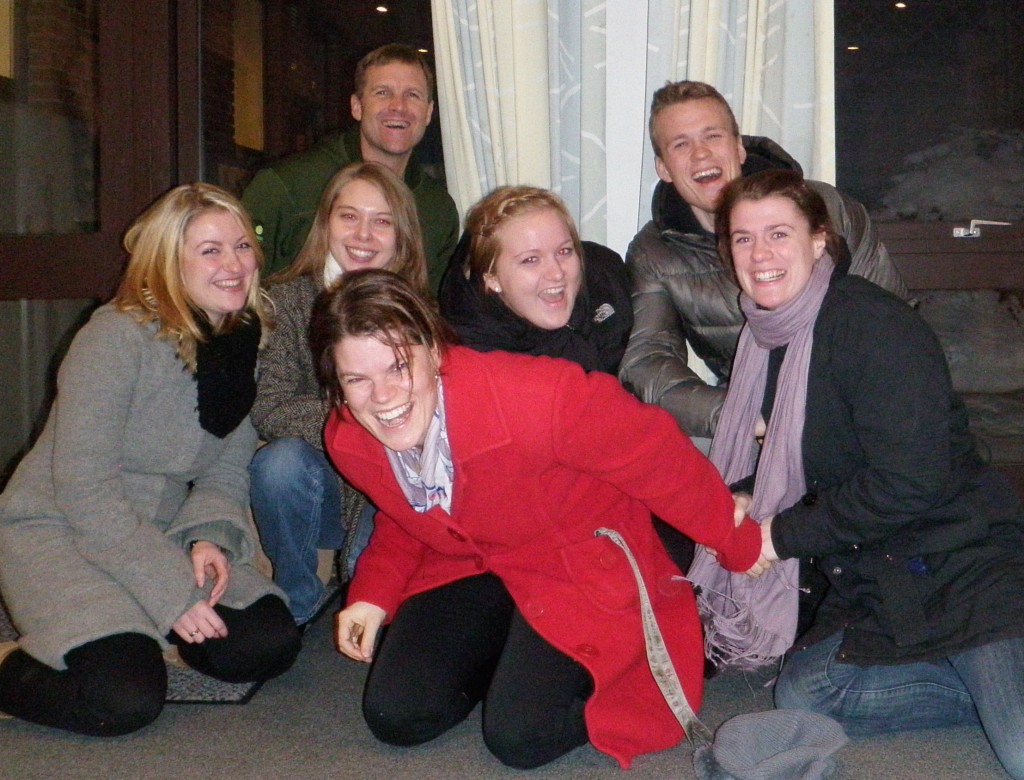I really believe that ministry is more “caught” than taught. What I mean by that is that young people learn more about being a disciple of Jesus by being around someone who is intentionally pouring their lives into them. Jesus spent most of his time with Peter, James, and John, and then the bulk of the rest of his time in ministry with the other eight of his 12 Disciples. Jesus was intentional about showing them day by day what it looked like to be in relationship with him. By being around him all of the time they learned by observation what his priorities were, how he spent his day, and what seemed to matter to him. They even observed what he ate, when he slept, how he recreated, how he talked to the Heavenly Father in prayer. For Jesus, it was “quantity” time with his Disciples as much or more than the “quality of time.”
Category Archives: Youth Ministry
Mormon Evangelism: Sharing Christ with Mormons
Foreign Policy reported on some of the current statistics of Mormonism. In the article, The Mormon Missionary: The Things They Carried, they reported there are:
83,000 full-time missionaries of the Church of Jesus Christ of Latter-day Saints who serve in 405 missions around the world. The number of full-time missionaries has risen by some 40 percent since 2012, when the church lowered the minimum age for serving from 19 to 18 for men and from 21 to 19 for women. But conversions haven’t kept pace: The church recorded just 3.4 baptisms per missionary in 2013, compared with 4.6 in 2012.
In my travels I can attest to seeing more Morm on missionaries all over the globe. I remember being in Samoa and seeing Mormon church after Mormon church as I drove throughout the island. Most Mormons introduce themselves as “Christians” and talk about their goal as “introducing people to Jesus Christ.” The problem is that, although their culture has many attractive attributes that display characteristics of Jesus Christ, their beliefs do not align with the teachings of the Bible. This can be very hard to know how to navigate in a conversation with a Mormon.
on missionaries all over the globe. I remember being in Samoa and seeing Mormon church after Mormon church as I drove throughout the island. Most Mormons introduce themselves as “Christians” and talk about their goal as “introducing people to Jesus Christ.” The problem is that, although their culture has many attractive attributes that display characteristics of Jesus Christ, their beliefs do not align with the teachings of the Bible. This can be very hard to know how to navigate in a conversation with a Mormon.
Probably the best book I’ve read on how to share the Gospel with Mormons is, I Love Mormons by David Rowe. Dr. Rowe has been a missionary to Mormons for a long time and offers keen insight. For Rowe, the proper starting point to Mormon evangelism is to approach it just as you would approach any other “culture”. The wrong approach is to start with the perspective that Mormonism is a “cult.” Although their beliefs do not align with Christianity, it is not effective to start out accusing them of being part of a cult. I highly recommend Rowe’s book. Some say that Mormonism will soon be, if not already, considered a “World Religion.” Followers of Jesus have a great opportunity in evangelism Mormons, and we need to prayerfully consider the urgency of missions to Mormons, as they are one of the more active “evangelists” of any other religion in the world.
Good Relationships (in a Sinful World) Require Conflict Resolution Skills – Joshua 22
Have you have had what you thought was a really great idea that in the end went horribly wrong? I share a story of one of my personal examples in the link below to my recent sermon on conflict resolution… Joshua 22 is a profound story that shows how three tribes of Israel had what they thought was a “Great Idea” but because of lack of communication, a colossal conflict was started amongst the other 9 the tribes of Israel.
Conflict resolution is not just a skill for counselors. If we want good relationships in a sinful world, we all have to learn how to resolve conflict. I recently taught on conflict resolution and thought I’d pass the link for you to listen along.
What You Will Learn about Conflict Resolution Skills By Listening to this Sermon:
- The incredible context behind an epic conflict that almost began a civil war among Israel (Joshua 22)
- Joshua 22 gives us a formula for conflict resolution that lawyers and professional peace-makers still use today.
- An easy memory tool called, “CHESS” that you can use to diffuse and resolve conflicts successfully
-
- C: Who are the characters/people involved in the conflict?
- H: Historical relationships (what is the history behind the relationships in the conflict?
- E: What is the flow of the Events to see where the problem arose?
- S: Sides (There are always two side’s of the story … if you want to be a peacemaker and relationship builder you need to realize there is always two sides to a story).
- S: State the problem clearly. Joshua clearly states the problem and resources to resolve the problem. He the relevant issues, what made the problem blow up, etc. Then Joshua explained what resources the people had to deal with the problem to resolve the conflict (they had the Law of Moses, and the authority of the priests to look into the matter). [1]
-
- How, “Conflict + Resolution = Intimacy”
- How the Church today can re-learn conflict resolution skills to advance the Gospel more effectively
Click here to LISTEN TO MY TALK ON CONFLICT RESOLUTION FROM JOSHUA 22
You may also enjoy another recent sermon from “Joshua 7: Achan’s Sin | the Human Story”
Please pass this post along to a friend who might benefit from it. Thanks!
[1] The case-writing principles developed in this post were inspired by the following case-study tool for missiology: 7 Steps to Making a Case Study into a Learning ToolHow to Handle Defeat or Failure Gracefully
I recently had a day of parenting that I would call a failure. I really love my kids so when I feel like a failure as a parent that can be really discouraging. The next morning as I was spending time with the Lord trying to restart so that I would not let my sense of defeat cause me to lose heart, I was reminded of a metaphor that helped.
LIKE THAT FEELING OF FAILURE WHEN YOU HAVE LOST A GAME
I have coached for a long time and currently I’m coaching a 12 and under baseball team. It is inevitable in any sport that a player is going to have a bad day. I have walked my kids through many of these situations and one common thread stands out. As the parent standing with my kids as they feel a sense of failure or defeat, my hope is always that they can simply learn from it and then move on quickly to the next opportunity for growth. It is hard to watch one of my kids remain downcast over a bad day on the field. What I love is when one of my kids can deal with their emotion of disappointment in a reasonable amount of time, and then find something to learn from and lift their chin and move on.
It sounds cliche to say that what matters from failure is how you deal with it and move on. But it is true. And I see in the Scriptures that our heavenly Father has a similar perceptive. God expects us to fail, massively, and often. Yet similar to a parent who is pulling for their child to learn, grow, and move on… God has that kind of perspective.
CONTENTMENT COMES FROM HUMILITY
A passage that encourages me along these lines is Psalm 131. It is a psalm about contentment. And contentment comes from humility.
My heart is not proud, Lord, my eyes are not haughty; I do not concern myself with great matters or things too wonderful for me.But I have calmed and quieted myself, I am like a weaned child with its mother; like a weaned child I am content. Israel, put your hope in the Lord both now and forevermore. (Psalm 131)
LISTEN TO YOUR HEAVENLY FATHER’S VOICE WHEN YOU FACE DEFEAT
How are you handling small or massive failures or defeat? Are you like the child after a game who keeps his head down and can’t snap out of it.. making a big deal out of something that really in the grand scheme of things is not that big of a deal? I’m grateful that although I met discouragement recently by a bad day of parenting, that once again (as usual) God’s Word helped me snap out if it and just learn and move on in hope.
REFLECTION
- Identify a recent time when you felt defeated. How did you handle it?
- Have you ever tried to cheer up or encourage another person after the lost a sports game? Can you remember a time when someone you know sat in disappointment for way too long? Was that hard for you to watch? Why?
- Consider this week how God the Father truly views failure and defeat. Like the Psalm above encourages us, try to “calm and quiet yourself like a weaned child” in the lap of your Father, and then chin up and move on. It’s probably not as big of a deal as you have made it out to be in God’s perspective.
- Remember what Job cried out in great hope: “I know that my redeemer lives…” (Job 19:25). God is actively at work redeeming you especially in the midst of your failures and defeat.
If Jesus isn’t Who He said He was, the World has No Hope | 10 Reasons
I recently had the privilege of sharing the Gospel with a young man in a foreign country who grew up in a family that taught that the way to God is only through believing the message of a different book than the Bible. After sharing the Gospel with him for a couple of hours I pleaded with him to take my Bible and read the story of Jesus for himself to see how different his story is from this other religious book.
Although he listened intently to everything that I told him about Jesus and seemed to want to believe it… he would not accept my Bible because he said that his father would disown him or kill him if he came home with it. This is where my mind went:
GENEROUS JUSTICE | A HELPFUL BOUNDARY AROUND THE TERM “SOCIAL JUSTICE”
 How does the term “social justice” strike you?
How does the term “social justice” strike you?
If you haven’t had a chance to read Timothy Keller’s book, Generous Justice: How God’s Grace Makes Us Just, I would highly recommend it. Below are a few quotes that give you a snapshot of some of what he is writing about. Depending on what circles you run in, the term “social justice” might mean a variety of things. You might be “turned off” by that term, or you might be passionate about it depending on your political or theological bent.
Regardless of your position, Keller’s book seems to approach social justice from a theological rather than sociological viewpoint which is very helpful. Followers of Jesus should never put their head in the sand when it comes to standing up for what is just, right, and fair, and Keller’s book is a helpful primer for thoughtful leaders who want to do just that.
7 Ways to Change How You Lead Meetings to Improve Teamwork
How often do you feel “dragged” into meetings? How often as a leader do you feel like you have to drag people into meetings when they’d rather be doing something else? No matter how hard we try, leading teams requires meetings. So how can we lead in such a way that meetings become meaningful and improve teamwork?
I recently read a very helpful article about teamwork by Daniel Harkavy called, “7 Steps to Improve Your Meetings — and Your Team’s Effectiveness.” Below I’m sharing an abridged version of Harkavy’s list that I’ve rewritten to help me be more effective at leading meetings. I’ve included a general list and a more specific list for youth ministry leaders. Hopefully by trying some of these suggestions you’ll notice immediate a change in attitudes among your team and will have improved teamwork.
VISION STATEMENTS | A WORD IS WORTH A THOUSAND PICTURES
If you could point to one characteristic visionary leaders have that gives them the unique ability to cast vision, what would it be?
My pick would be that visionary leaders tend to use word pictures in their vision statements to paint a picture in people’s minds. Visionary leaders have a tenacious desire to inspire people to pour themselves into causes that they believe must happen. They know that vision is not just about sharing good ideas. Vision casting states reality and boldly asserts what must be done, now.






